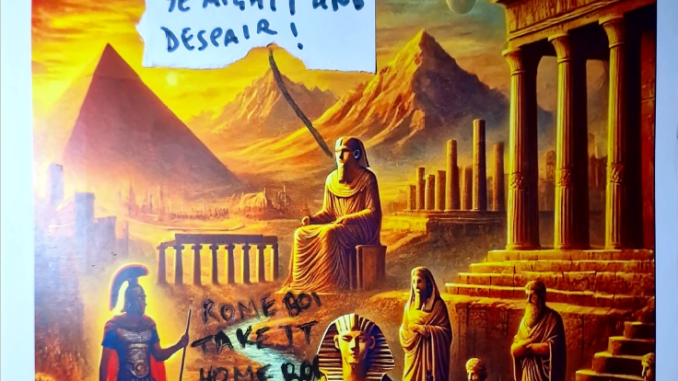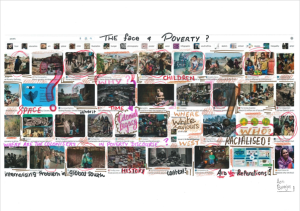
Instructor: Dr Christoffer Guldberg
Email: christoffer.guldberg@kcl.ac.uk
Module: Introduction to Qualitative Methods (level 7) and Gender, Society and Development (level 7)
Faculty: Department of International Development
*Featured meme on Ancient History by Zenia Duell, PhD student at War Studies
Why did you introduce this approach to assessment?
It started as a way of teaching critical thinking around concepts. The summative assessment for both modules is an essay (with a reflective diary on the Gender module). Critical thinking is a key learning outcome on these courses and in my discipline, and therefore one of the criteria for marking students’ work. When reading student essays, I notice that students tend to reify concepts uncritically. In other words they seemed to take concepts for granted, often ignoring the historical – including colonial – background of these concepts. I started doing this activity in Brazil during my PhD researching drug trafficking and how people used memes to question and resist such colonial concepts, drawing on the work of Henri Bergson. For example, when you ask AI for results about certain concepts (e.g. drug trafficker) it often gives explicitly and implicitly racialised and gendered results. I developed this into a teaching method to highlight this for other concepts such as migrants (vs ex-pat), refugees, sovereignty, countries in the Global North vs Global South etc. Therefore, I felt this sort of activity was a good way to help my students exercise critical thinking around presentations of concepts and how AI is challenging or perpetuating these stereotypes and biases.
This is also an attempt to help student to critically use GenAI for assessment. I wanted to be able to see the input of the students through a process which they follow in addition to the use of GenAI and this is crucial today for thinking about assessment approaches.
I have already published on this using Google Image searches so this GENAI work is a natural extension of this. Guldberg, C. (2024). Decolonising AI and memes with Freire and Bergson. Comfortably Uncomfortable, Decolonial Blog of KCL. And Guldberg, C. (2022). Using Google Images, Maps and Earth to teach critical thinking: Decolonising the curriculum and beyond. Journal of PGR Pedagogic Practice, 2, 61-78. https://doi.org/10.31273/jppp.vol2.2022.1231
How did you set it up?
- Students choose a concept according to the topic of the module. This choice is part of the process as students should think about what would be most interesting to interrogate.
- They choose an AI tool (at KCL we use CoPilot) and then generate results. Visual results are most interesting for analysis, but text results are also fine. The students then analyse this in groups or in plenary with the teacher.
- Production of memes: students write or draw on top of these results to produce a social media artefact themselves. Here is an example:
 The Face of Poverty by Aditi Banerjee, UG student in Education, Communication & Society Reproduced with permission from Christoffer Goldberg, Decolonising AI and memes with Freire and Bergson 2024.
The Face of Poverty by Aditi Banerjee, UG student in Education, Communication & Society Reproduced with permission from Christoffer Goldberg, Decolonising AI and memes with Freire and Bergson 2024.
How do you give feedback?
This is developing over the time I have been doing this formative work. The process of steps above is very iterative and I work with students at all stages to provide verbal feedback. It is not very time consuming for me as I don’t need to give written feedback on the work and all the work is done in class, which makes the time spent in class enjoyable for students as well as me as a teacher.
What benefits did you see?
Students produced some very high-quality work and are highly engaged within the classes. Attendance is usually pretty high. We held an exhibition of student memes at the Exchange, and featured a launch event with Brazilian music, poetry and talks by academics from the Global South, as well as a symposium on visual methods, arts and decolonisation. We are developing a social media account for students to be able to publish and discuss as well: https://www.instagram.com/uncomfortable.kcl/. The work is showing the levels of criticality not just about concepts in the module but also about the use of AI in wider areas. This is useful for employability.
Students have commented on the value of this work for their critical thinking. For example,
“..especially during the process of writing my final paper I realized that even though the course had ended, I would continue my research on gender issues in the future (..) Your encouragement to think critically and embrace different perspectives has had a profound impact on my personal growth”.
It can be more inclusive for students whose first language is not English or those who may struggle more with written texts, as much of the work here is through a visual medium, catering for diversity amongst the student cohort.
What challenges did you encounter and how did you address them?
- I am aware that there may be digital literacy gaps for some students or some students who do not want to use AI for ethical reasons. So far this has not happened on the module, but if this were to happen, this would form the basis of a critical discussion.
- Students are also becoming quite competitive about their use of AI tools, which has the potential to lead to a digital equity gap in socio-economic terms. King recommends CoPilot and so this is the tool we use in class. But in these modules, if students are using different AI tools this is an opportunity for students to reflect on how the AI takes into account the data it has collected on them through their search histories Part of this process is for them to reflect on this and understand AI in a deeper or more critical way.
What are your next steps?
The value is primarily formative, but I am considering its use in summative assessment. This would require robust criteria and grading system.
We have received money for the Strategic College teaching fund to develop a series of workshops/ a course for students and staff on this method. These are currently advertised on Skillsforge. If we can get a good number of students and staff, we can evaluate and facilitate a dialogue as to how this could work as a form of assessment.
We intend to speak about this at the AdvanceHE conference with a view to publications. This is to encourage further dissemination of this work for wider HE audiences. There will be a symposium and exhibition in early May. As part of the decolonial collective, I host the podcast, AI and Decolonisation – a Mostly Human Podcast with interviews and discussions about AI and decolonisation. https://undotcomfortable.wordpress.com/podcasts/
What advice would you give to colleagues who are thinking of trying this type of assessment?
This is suitable for most courses where critical thinking about concepts and/or use of predictive and/or GenAi is pertinent. This work could be online or in person as it works in either mode. The workshops are our next step to encourage colleagues to think about how they will do this themselves in their own disciplines and courses.

Leave a Reply